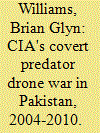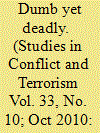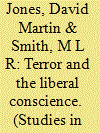| Srl | Item |
| 1 |
ID:
099492


|
|
|
|
|
| Publication |
2010.
|
| Summary/Abstract |
This article provides the first overview of the CIA's secret drone campaign against Al Qaeda and the Taliban in Pakistan's tribal areas from its origins in 2001's Operation Enduring Freedom to the end of 2010. In the process it addresses the spatial dimensions of the campaign (where are the strikes being directed and where do the drones fly from), Pakistani reactions to this threat to both their sovereignty and an internal Taliban enemy, technological developments and Taliban and Al Qaeda responses to this unprecedented airborne assassination campaign. While the debate on this issue has often been driven by the extremes which either support the campaign as the most effective tool in killing terrorists or condemn it for driving Pakistanis to new levels of anti-Americanism, this article points out a third path. Namely, that many Pakistani Pashtun tribesmen living in the targeted areas support the strikes against the Taliban who have terrorized them in recent years.
|
|
|
|
|
|
|
|
|
|
|
|
|
|
|
|
| 2 |
ID:
099494


|
|
|
|
|
| Publication |
2010.
|
| Summary/Abstract |
Islamist militants frequently lack a talent for tradecraft. In recent attacks in Britain and Spain, terrorists made numerous mistakes: receiving traffic citations while traveling in "enemy" territory, acting suspiciously when questioned by the police, and traveling together during missions. Militants' preference toward suicide operations restricts their ability to acquire practical experience, particularly when they lose their lives during attacks. And their unyielding devotion to their cause blinds them to opportunities to improve their operations. This is good news for counterterrorism officials. Terrorists' poor tradecraft provides alert law enforcers with critical leads they can use to identify their attackers, unravel their plots, and-sometimes-disrupt their operations before they cause additional harm.
|
|
|
|
|
|
|
|
|
|
|
|
|
|
|
|
| 3 |
ID:
099495


|
|
|
|
|
| Publication |
2010.
|
| Summary/Abstract |
After the attacks on the World Trade Center and Washington, D.C. in 2001 the Library of Congress Cataloging-in-Publication devised a new classification. The category, September 11 Terrorist Attacks 2001-Fiction, responds to a distinct genre of political novels. In the light of the philosopher Richard Rorty's contention that the Western novel can clarify the moral and political options that confront the West, the article examines what insight, if any, into the motive for violence, and the capacity to recuperate a sense of liberal progressive purpose, the novels of 11 September afford?
|
|
|
|
|
|
|
|
|
|
|
|
|
|
|
|
| 4 |
ID:
099493


|
|
|
|
|
| Publication |
2010.
|
| Summary/Abstract |
This article distinguishes the demand from the supply of counterterrorism following either a large-scale terrorist attack or campaign. On the demand side, terrorism shocks increase the willingness of civilians to sacrifice their liberties for security, thereby giving the government a mandate to augment defensive and proactive measures against the terrorists. The supply side differs greatly between domestic and transnational terrorism. Supply problems may plague countermeasures against transnational terrorism as at-risk nations act strategically. In particular, there is a strong proclivity for nations to overspend on defense and to underspend on proactive measures. These tendencies are explored using simple game theory. A country's sovereignty also bolsters the ability of targeted nations to address domestic terrorism with an appropriate mix of counter- terrorism measures.
|
|
|
|
|
|
|
|
|
|
|
|
|
|
|
|